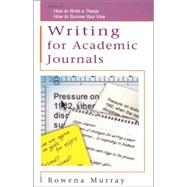
Rowena Murray is based at the University of Strathclyde, Glasgow, Scotland. She is a visiting professor at Swinburne University, Melbourne.
| Preface | xi | ||||
| Acknowledgements | xiv | ||||
| Introduction: Beyond reason and vanity | 1 | (8) | |||
| 1 Why write for academic journals? | 9 | (27) | |||
|
10 | (1) | |||
|
11 | (1) | |||
|
12 | (1) | |||
|
13 | (1) | |||
|
14 | (1) | |||
|
14 | (2) | |||
|
16 | (2) | |||
|
18 | (1) | |||
|
18 | (4) | |||
|
22 | (1) | |||
|
23 | (1) | |||
|
24 | (1) | |||
|
25 | (1) | |||
|
26 | (1) | |||
|
27 | (1) | |||
|
28 | (2) | |||
|
30 | (1) | |||
|
31 | (1) | |||
|
32 | (1) | |||
|
33 | (1) | |||
|
34 | (1) | |||
|
35 | (1) | |||
| 2 Targeting a journal | 36 | (31) | |||
|
37 | (1) | |||
|
38 | (3) | |||
|
41 | (1) | |||
|
42 | (1) | |||
|
43 | (1) | |||
|
44 | (6) | |||
|
50 | (1) | |||
|
50 | (2) | |||
|
52 | (5) | |||
|
57 | (2) | |||
|
59 | (1) | |||
|
60 | (2) | |||
|
62 | (1) | |||
|
62 | (1) | |||
|
63 | (2) | |||
|
65 | (1) | |||
|
65 | (1) | |||
|
66 | (1) | |||
| 3 Finding a topic and developing an argument | 67 | (32) | |||
|
69 | (2) | |||
|
71 | (2) | |||
|
73 | (1) | |||
|
74 | (7) | |||
|
81 | (1) | |||
|
82 | (3) | |||
|
85 | (6) | |||
|
91 | (2) | |||
|
93 | (1) | |||
|
93 | (1) | |||
|
94 | (1) | |||
|
95 | (1) | |||
|
96 | (1) | |||
|
96 | (1) | |||
|
97 | (1) | |||
|
98 | (1) | |||
| 4 Outlining | 99 | (18) | |||
|
104 | (4) | |||
|
108 | (1) | |||
|
108 | (6) | |||
|
114 | (1) | |||
|
115 | (1) | |||
|
116 | (1) | |||
| 5 Drafting | 117 | (20) | |||
|
119 | (6) | |||
|
125 | (1) | |||
|
126 | (1) | |||
|
127 | (7) | |||
|
134 | (2) | |||
|
136 | (1) | |||
| 6 Revising the draft | 137 | (15) | |||
|
139 | (3) | |||
|
142 | (1) | |||
|
143 | (3) | |||
|
146 | (1) | |||
|
146 | (1) | |||
|
147 | (1) | |||
|
147 | (1) | |||
|
148 | (1) | |||
|
149 | (1) | |||
|
150 | (1) | |||
|
151 | (1) | |||
|
151 | (1) | |||
| 7 Finding time to write | 152 | (17) | |||
|
154 | (1) | |||
|
155 | (1) | |||
|
156 | (3) | |||
|
159 | (4) | |||
|
163 | (1) | |||
|
163 | (1) | |||
|
164 | (1) | |||
|
165 | (1) | |||
|
165 | (3) | |||
|
168 | (1) | |||
| 8 Dialogue and feedback | 169 | (18) | |||
|
170 | (6) | |||
|
176 | (8) | |||
|
184 | (1) | |||
|
185 | (1) | |||
|
186 | (1) | |||
| 9 Responding to reviewers' feedback | 187 | (27) | |||
|
188 | (1) | |||
|
189 | (5) | |||
|
194 | (2) | |||
|
196 | (1) | |||
|
196 | (1) | |||
|
197 | (3) | |||
|
200 | (1) | |||
|
201 | (1) | |||
|
202 | (1) | |||
|
203 | (2) | |||
|
205 | (1) | |||
|
206 | (1) | |||
|
207 | (1) | |||
|
208 | (2) | |||
|
210 | (1) | |||
|
211 | (1) | |||
|
211 | (2) | |||
|
213 | (1) | |||
| Bibliography | 214 | (7) | |||
| Index | 221 |
The New copy of this book will include any supplemental materials advertised. Please check the title of the book to determine if it should include any access cards, study guides, lab manuals, CDs, etc.
The Used, Rental and eBook copies of this book are not guaranteed to include any supplemental materials. Typically, only the book itself is included. This is true even if the title states it includes any access cards, study guides, lab manuals, CDs, etc.